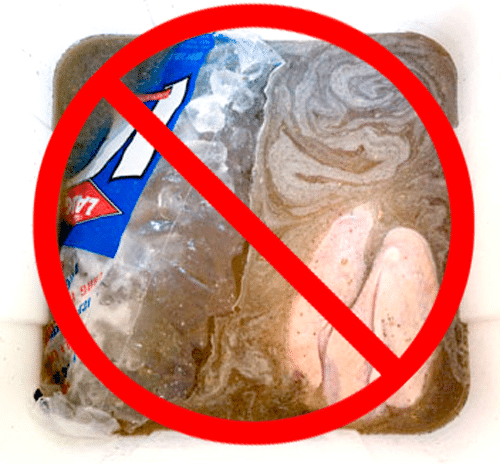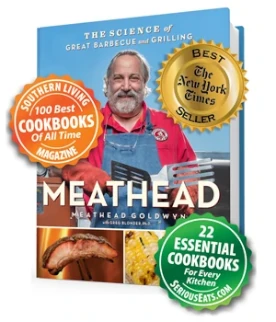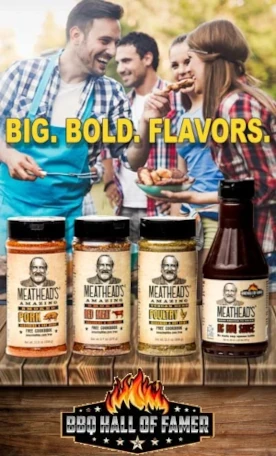I missed the link that shows the graph of win percentage vs meat salting technique. Please re-post the link.
Announcement
Collapse
No announcement yet.
The facts against dry brining
Collapse
This topic is closed.
X
X
-
Club Member
- May 2016
- 5697
- Huntington Beach, Ca. Surf City USA.
-
Equipment
Primo Oval xl
Slow n Sear (two)
Drip n Griddle
22" Weber Kettle
26" Weber Kettle one touch
Blackstone 36†Pro Series
Sous vide machine
Kitchen Aid
Meat grinder
sausage stuffer
5 Crock Pots
Akootrimonts
Two chimneys (was 3 but rivets finally popped, down to 1)
cast iron pans,
Dutch ovens
Signals 4 probe, thermapens, chef alarms, Dots, thermapop and maverick T-732, RTC-600, pro needle and various pocket instareads.
The help and preferences
1 extra fridge and a deep chest freezer in the garage
KBB
FOGO
A 9 year old princess foster child
Patience and old patio furniture
"Baby Girl" The cat
Erik S.
Meatheaddocblonder Both put forth their evidence with science and sometimes their opinion.
More importantly they they present their argument backed with actual facts and sign their name to it. They present to the public/paid members. These paying members expect no less and will hold their "feet to the fire."
Respectfully sir, people (the names you mentioned above) make great food:
1. How does that translate into saying that dry brining make food mushy?
2. How does that translate into dry brining causes you to oversalt food?
3. How does that translate into "The reason for brining is to tenderize meats?"
Many different things happen when you Brine.
I think that saying (without certainty) because some one else does/does not do something a certain way, it may be presented as fact is where an issue is.
We sear to seal in the juices right? We need to sear before we cook right? Those things have been done for years and still are. Crazy right?
Whatever makes your boat float. no one can argue how you like stuff. That’s not their business.
I put grill marks on thousands of pieces of protein. I do it for no scientific reason other that that’s what people want to see. To them
it makes it taste better. Doesn't make it true though. It’s the entire cook.
When you present other people and their cooking as fact and offer nothing by way of your own it causes people to take notice. Especially when "facts" is in your thread title.
- Likes 7
Comment
-
Dry-brining provides two key advantages over no-brine:
1. The meat is thoroughly seasoned as the salt penetrates the meat.
2. As the salt penetrates the meat it changes the cell structure causing the meat to retain more water when cooked.
With a high-collagen and high-fat piece of meat those advantages pretty much become moot. With the stall pulling water to the surface changing the cell structure is negated. The moistness of a brisket comes not from retaining water, but from the rendering of fat and the breakdown of collagen and that also is where the succulent flavor is coming from.
Now, for every day type of meats, pork tenderloin, boneless skinless chicken breast, NY strip, etc. dry brining creates a very noticeable difference.
mountainsmoker I encourage you to try an experiment:
Cook 2 boneless, skinless chicken breasts. Dry-brine one and no-brine the other. Cook them in the same cooker at the same time and then see if you notice a difference between the two.
One final note: Dry-brining isn't something Meathead and Dr. Blonder created just a few years ago. I read about it in "Cooks Illustrated" years before this site was created.
- Likes 3
Comment
-
I dry brine simply because it takes up less room in the fridge and it uses less salt. If I was running The Shed and cooking tons of BBQ daily then I would have more equipment and salt consumption would be less of an issue. Just plop the meat into a brine bucket and be done with it. Quick and easy, as the prep work to make 50 gallons of brine is less work than individually salting each thing to be cooked that day.
Also there is the whole "don’t screw with the recipe" thing. The famous BBQ places do things a certain way, usually for a long time. If it works don’t need to fix it.
Anyhow for what I do at home, dry brining offers very real advantages. I do wet brine some stuff, namely fish and corned beef. Sometimes poultry. But most of the time it is just more convenient to dry brine. As long as the end result is good, 6 of one 1/2 dozen of the other.
- Likes 3
Comment
-
Club Member
- Sep 2015
- 5673
- Tennessee
-
22" Weber Kettle w/SNS, 18" WSM, Bronco, Grilla Chimp, Traeger Tailgater, UDS, Camp Chef Tahoe Stove.
Meathead recommends dry brine. So thats what I do. Results have been better than before. The science I am following is the science of smacking lips and empty plates.
- Likes 13
Comment
-
Club Member
- Aug 2018
- 1296
- Heart of Dixie
-
Kamado Joe Big Joe III, PKGO, PK300, Jumbo Joe and PBC. Weber kettle @ the hunting camp.
I've eaten NC bbq, it is truly unique and I'm glad it is available. It is however, not the only way to cook pork.
Alton Brown convinced me years ago that dry brining was a valuable technique before I ever heard of AR. Dry brining and wet brining work for me. I prefer dry brining because of limited fridge space and i get great results from the method.
Stating you've been doing something for XX years doesn't mean much if you're doing it wrong.
- Likes 2
Comment
-
Meathead, see there you go, even the celeb’s know where to go for bbq knowledge. The point I was making is that I was dry brining before I ever knew AR existed, but there you are doing your thing, making the bbq world a better place. So I guess, indirectly you had influence on me without my knowledge. That makes you a BBQ Jedi or something....🤷ðŸ¼â€â™‚ï¸
- 2 likes
-
I research this site when I do my show too.
What show you may ask? Well, it’s, it’s the FireMan Cook by Fire Show. It currently has one subscriber, he goes by the nick name The Derbster. Yeah, he watches all the time, well almost all the time, in between frequent naps.
- 3 likes
-
I think the "facts" mountainsmoker is referencing is that the most renouned BBQ restaurants don't employ the dry-brine method, yet the quality of the Q results in people waiting in line for hours.
Honestly, it's a pretty solid argument as it pertains to low/slow types of meats.
Comment
-
It’s the exact opposite of a "solid argument". Just because restauranteurs can produce great food without dry brining doesn’t prove anything except they produce good food without dry brining.
I bet Dale Earnhardt can beat me on a race track driving a Prius while I’m driving a Porsche but it doesn’t prove an argument that a Prius is a better racing car than a Porsche.
- 1 like
-
Home cooks generally don’t have to make 600 covers a day.
- 1 like
-
I can't help but chuckle a bit when people compare themselves to the "greats" like Franklin because they've watched him a cook a few times. I mean the man probably cooks 100,000 pounds of brisket a year! Just because a young boy tries to mimic his swing after Mike Trout or Ken Griffey Jr doesn't mean he is going to hit 50 homers and be a future hall of famer.
To each their own. I dry brine when I try Meathead's recipes because that is what he says in his instructions. If I was following a Franklin recipe and he told me to wet brine then I would try to wet brine. Then I'd form my own opinion as to which method I think is better. Just because one method works for someone else doesn't mean it will work for me.
- Likes 3
Comment
-
HouseHomey
1) Never heard dry brining makes food mushy. Anywhere.
2) Oversalting is personal taste. But for most people it really is only a problem if food has been injected previously as are most turkeys.
3) Salting has little effect on tenderizing. Fact. Not opinion.
- Likes 3
Comment
-
These points are in reference to some comments made in the Berkshire Butt thread: https://pitmaster.amazingribs.com/fo...berkshire-butt
- 2 likes
-
Me either. That’s what I was trying to say in my scattered kind of way.
- 3 likes
-
I'm getting old and set in my ways. When I discovered how much less trouble dry brining was compared to wet I gladly changed. I enjoy listening to a good debate. I like it even more with a gin and tonic with a lime twist. Which is what I will have in hand this evening when I check back in to see where this has gone.
- Likes 1
Comment
-
grantgallagher How long to dry brine depends on thickness. Salt moves slowly. Thin steaks like flank need less time than 2" ribeyes. That said, salt moves faster during the cook (molecules move faster when warm). Discussed in detail here
 Achieve juicy, tender, and flavorful meat every time you hit the grill thanks to one simple ingredient: salt. Sprinkling salt on finished meats helps amplify the flavor on the surface but brining helps bring the benefits of salt to every bite. Here's how salting and brining can significantly improve your cooking.
Achieve juicy, tender, and flavorful meat every time you hit the grill thanks to one simple ingredient: salt. Sprinkling salt on finished meats helps amplify the flavor on the surface but brining helps bring the benefits of salt to every bite. Here's how salting and brining can significantly improve your cooking.
- Likes 1
Comment
-
In Kenji’s test he showed that between a few minutes and 40 minutes was the worst because the extracted salted surface juices haven’t re absorbed yet and you lose them. So this prescribes a _minimum_ of 40 minutes, max depends on thickness and the desired effect.
In other words if you can’t wait 40+ minutes, you are better off salting right before cooking.
-
My understanding as well, Polarbear777, I hold to a 2 hr minimum for dry brining, which I might have read somewhere (Meathead?). Takes 1 hr to pull out the juices and another hour for them to reabsorb salted. Go longer if you choose, but any less--salt just before grilling. I regularly dry-brine prime NY Strips to optimize flavor. Scientific, schmientific--works for me!
- 1 like
-
Club Member
- Aug 2017
- 10131
- Hate Less, Cook More
-
OUTDOOR COOKERS
BBQ ACCESSORIES
WOOD & PELLET PREFERENCES
SOUS VIDE
INDOOR COOKWARE
mountainsmoker you stated at the end of the last dry brining go round that you hoped you didn't "offend" anyone. Then come right back and stir the hornet's nest again with your outspoken opinions. Are you really interested in being part of our community with your continued outlandish statements or supposed fact, or are you just trying to piss everyone off and hope for general acceptance? Please either back off and try to blend in or alienate yourself some more and be ignored. Your choice my friend.
- Likes 7
Comment
-
Club Member
- May 2016
- 5697
- Huntington Beach, Ca. Surf City USA.
-
Equipment
Primo Oval xl
Slow n Sear (two)
Drip n Griddle
22" Weber Kettle
26" Weber Kettle one touch
Blackstone 36†Pro Series
Sous vide machine
Kitchen Aid
Meat grinder
sausage stuffer
5 Crock Pots
Akootrimonts
Two chimneys (was 3 but rivets finally popped, down to 1)
cast iron pans,
Dutch ovens
Signals 4 probe, thermapens, chef alarms, Dots, thermapop and maverick T-732, RTC-600, pro needle and various pocket instareads.
The help and preferences
1 extra fridge and a deep chest freezer in the garage
KBB
FOGO
A 9 year old princess foster child
Patience and old patio furniture
"Baby Girl" The cat
Erik S.
Comment
-
Larry Grover In his book "Franklin Barbecue" in the back he lists three references, Harold McGee's book on Food Science "On Food & Cooking", the monumental 6 volume set "Modernist Cuisine" by physicist Nathan Myrvhold and his team (many of whom are now at ChefSteps), and a website, Amazing something.
- Likes 9
Comment
-
"I have a scientific background."
This statement, heard in conversations on many topics (think climate science for one, vaccines for another), is one worthy of further discussion. Most of the time, it can literally be translated to mean: "this doesn't make sense to me and I'm smart" or similar. To be blunt, the fact is, unless you are educated in the relevant field(s), your "scientific background" usually doesn't mean squat and your (or my) thoughts on the subject carry no weight beyond that of an uninformed opinion. I doubt that Einstein, a genius in physics and mathematics, told his doctor how to practice medicine or tried to tell geologists where to find oil or minerals. I'm not trying to be a jerk here, but this issue is a pet peeve of mine and over the years I have seen "I have a scientific background" abused to no end.
A funny story: a buddy of mine likes to use "logic" (a variation on "scientific background") to figure things out. One day over lunch, the topic of relativity came up and he was unaware that the speed of light is considered to be an absolute maximum for any object. It bothered him and he spent a few days pondering it "logically". The next time we met, he announced that he now understood why the speed of light couldn't be exceeded.
Wait for it...
Because then you'd be going faster than light and wouldn't be able to see what was in front of you, which would be quite dangerous. I groaned internally, smiled, kept my mouth shut, and changed the topic.
As regards dry brining, the fact is that many of us here do this and we know by experience that it doesn't lead to mushiness--no science necessary.
Cheers!Last edited by Willy; June 24, 2019, 12:19 PM.
- Likes 6
Comment
-
So riddle me this Batman, "If a tree falls in a forest and no one is around to hear it, does it make a sound?" Is that considered a philosophical thought experiment that raises questions regarding observation and perception? So it may be with dry brining.
-
Troutman If I'm your intended "Batman" (or your huckleberry), then my answer is that sound, defined as a vibration-caused pressure wave traveling through a medium, is definitely created whether or not anyone hears it. I can't connect this thought to dry brining?
Is the far side of moon "lit up" even though humans can't see it? ('ceptin' during a full moon)Last edited by Willy; June 24, 2019, 05:59 PM.
-
My point is observation and perception, along with first hand experience, is the proof that a fallen tree makes a sound. Thus the OP’s obvious lack of experience, much less observation, makes his dry brine statements totally baseless.
Announcement
Collapse
No announcement yet.








Comment